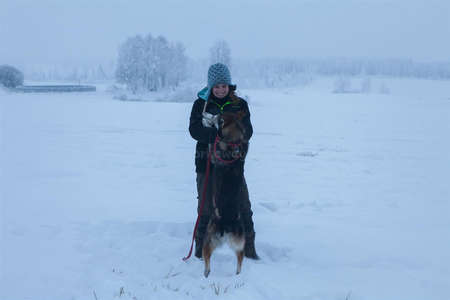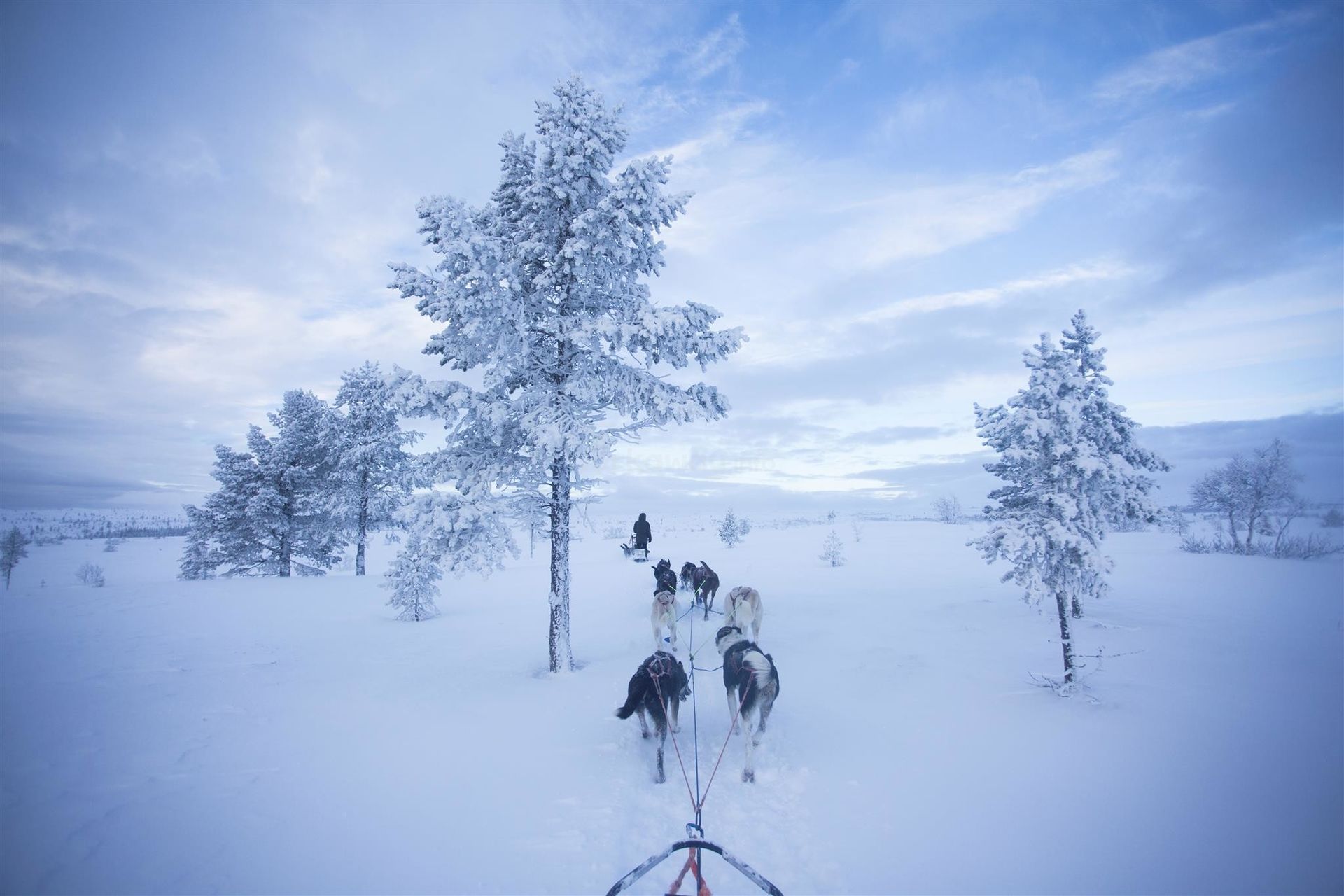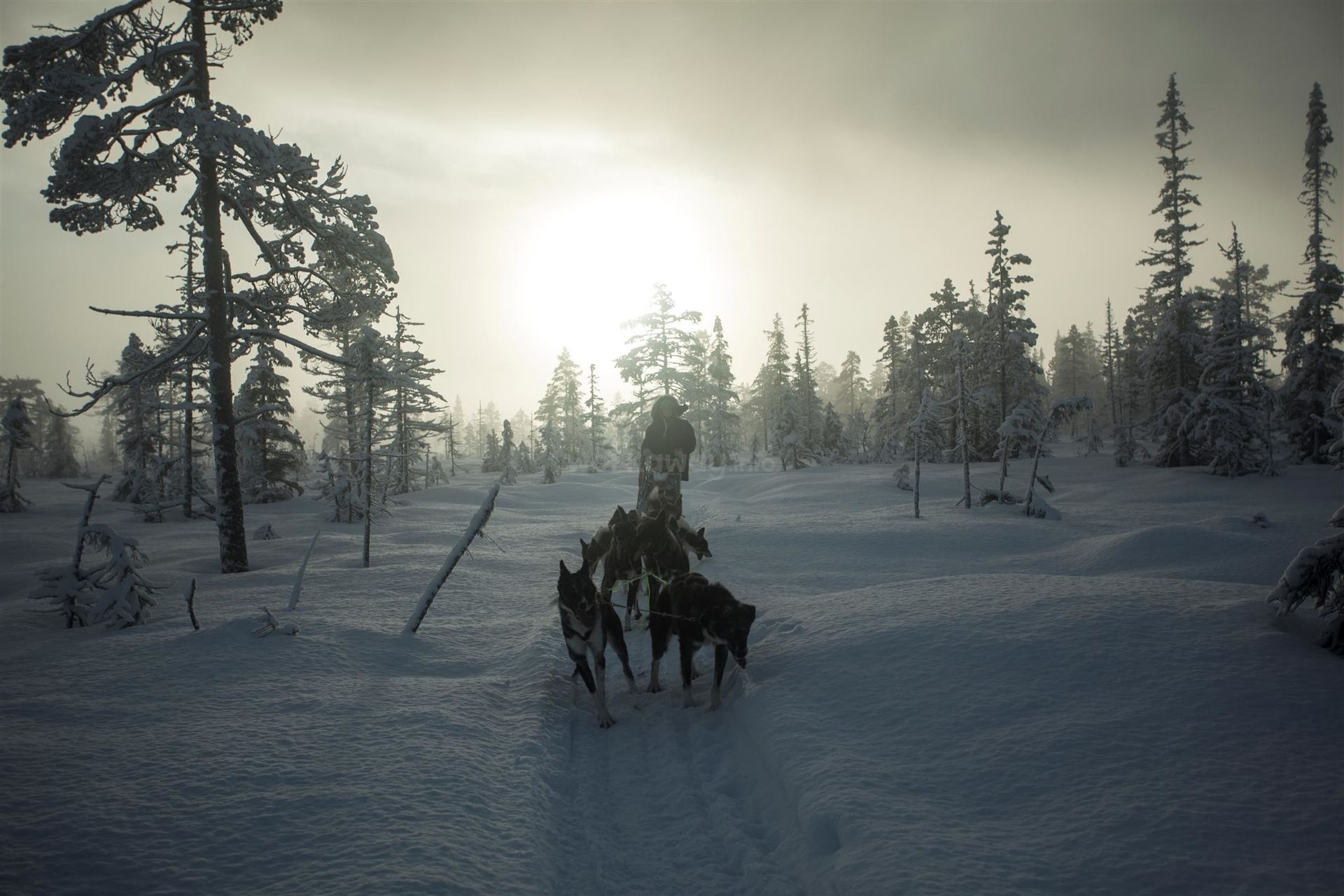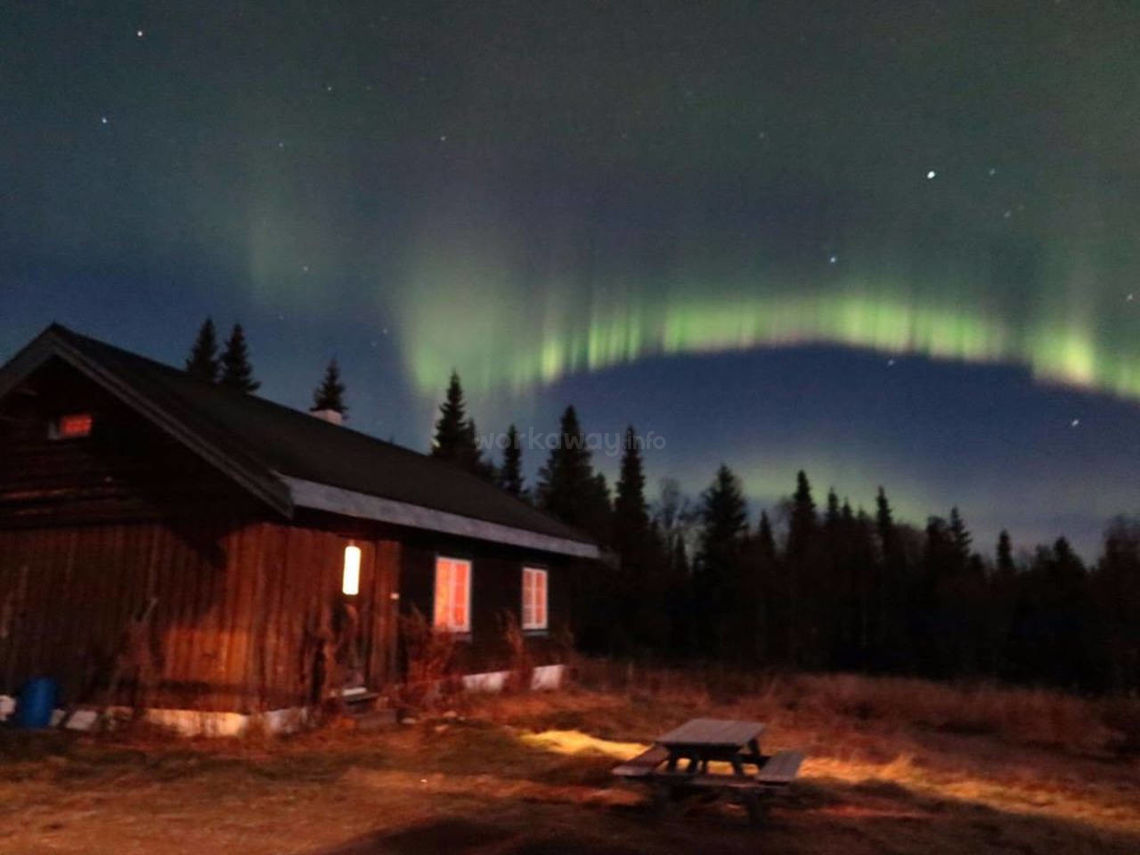The workawayer who ran away from city life to live with huskies
At Workaway, we absolutely love getting to know you all, whether it’s meeting you on the road, at a Workaway trip or hearing about your adventures through e-mails and social media. We couldn’t be prouder to be involved with such an inspiring community of travellers, which is why we just have to share some of the stories you tell us!
Meet Marije, the Dutch adventurer. Once a city girl, she now prefers to travel alone and live the simple natural life in remote destinations. When being in the city became too much, she sold everything and gladly swapped the pressures of socializing with the companionship of 40 huskies. Her initial plan to stay with a Workaway host on a husky farm in Norway for 6 months was extended to 2 years! She told us how she discovered a way of living and companionship which suited her personality much better than her previous city life. She believes that we could all benefit from immersing ourselves in nature and facing challenges which allow us to see our hidden strengths.

Over the last 12 years I’ve been away from home several times for long periods. Ever since I was young I had dreamt of travelling on my own. I can’t explain where that feeling came from, but the idea of travelling on my own fascinated me, probably because it gave me a feeling of freedom and independence. Travelling with a friend never really crossed my mind.
When I was 19 I went to Ireland to work as an au-pair for 6 months — my first long-term journey abroad. After that, I never stopped dreaming of possible future destinations to travel to. Both during and in-between studies I kept planning new adventures. I went backpacking in Australia, New Zealand and Asia and I did an internship in Suriname (South America). I studied Social Care Work for 4 years and after that Journalism, which took me 6 years including travel breaks.
When I finished studying I went to Alaska and Canada for 6 months and became a Workaway volunteer. In Alaska I worked on different farms; on an alpaca farm in the south and on an oyster farm , living on a float in the remote waters of south-east. In the Canadian Yukon, I had my first experience with huskies on a sled dog farm . I took care of the huskies for a month and I learned sledding with them, which was amazing! I adored Alaska — that place has everything I love: wildlife, beautiful nature and lots of space. I loved the back-to-basics lifestyle, it suits me very well. For the first time, I wasn’t looking forward to go back to Holland. I didn’t want to go back to my busy city lifestyle. I was still in Alaska when I searched for a sled dog address in Norway. I wanted to learn more about sled dogs, but a little closer to home, so I could still travel to Holland once in a while to visit family and friends.
So I gave up my rental apartment, sold all my belongings and booked a single ticket to Norway. In Norway I hoped to find similarities to the Alaskan nature and lifestyle. I wanted a simple life, outdoors. The plan was to stay at the Workaway husky farm for six months and then find a more ‘regular’ paid job in Norway to be able to stay there long term. I didn’t call this move ’emigrating’ but I didn’t see myself going back to Holland soon either — I had left for an indefinite period of time.

The first months at the sled dog farm were quite intense. Training and taking care of 40 Alaskan Huskies is a big job. It takes quite a while to get to know the dogs and the working routine. There was so much to learn and even after 2 years I felt like I was still learning every day. I trained the dogs for long distance racing, in which my host is competing. Norway is Europe’s capital of sled dog racing; there are many races organized throughout the winters.
I learned to drive and how not to drive on slippery roads, and I learned to prepare the property for cold and snowy weather. To pick up everything from the ground (tools etc.) before the snow falls; otherwise you won’t find it back until the snow disappears again in spring. To always keep a tap open to prevent the water supply system from freezing — and how to haul water from the river when water supply system freezes anyway. Also to always have candles within reach, in case the electricity fails.
I lived quite remote at a very quiet place in the woods and we didn’t see many other people. There were a few other farms around me, the closest at about 1.5 km from my house. I lived there with 1 or 2 other workawayers and our host Stein lived with us part-time in the summers and full-time in the winters. Once a week we did groceries in a town, 30 minutes drive from our home. We had all the luxuries we needed, like electricity, running water and limited internet, but we lived close to nature and that was exactly how I liked it. In Holland I have many friends and relatives and meeting up with them for different occasions started to feel like social obligations for me, which made me feel uncomfortable. I really enjoy having time to be by myself. So being far away from civilization was perfect for me. After all, with 40 huskies in the yard you are never really alone! They are great companions. <3
Training and taking care of sled dogs is a lifestyle, not a job. It takes a while before you get the hang of it. If you really love this work like I do, you don’t need much else in life than just being with the dogs all day long. It can be hard physical work sometimes but for me it doesn’t even feel like work. When you live with these huskies 24/7, you form a great bond with them. So after 6 months, by the time I was about to leave, the dogs had become my passion, the people around me felt like family and the farm was my home — I didn’t feel like leaving yet.
Over the 2 years I was at the husky farm, friends and family would sometimes come to visit me and I flew to Holland about 3 times a year to catch up with everybody. It’s only a one and a half hour flight, so I didn’t feel like I was very far from home, also because I kept in touch with everybody through internet messaging. I never missed Holland but what I did miss was biking and rollerblading. In Holland people use their bike a lot to visit a friend or do groceries, the roads are nice and flat there which makes biking and rollerblading easy! In Norway I always had to use the car if I wanted to go somewhere and sometimes I wished I had my bike instead.
I spent Christmas in Norway once. Norway is a beautiful place to celebrate Christmas, with lots and lots of snow and amazing northern lights at night. I loved having a few quiet Christmas days in the woods, with the dogs. It’s nice to spend time with my family in Holland but Christmas is always quite busy for everyone and for me it is one of those social obligations I don’t like. So, if I don’t actually get to spend Christmas with my family, I visit them at some other point over the winter months.
Yes, this experience has changed my life in a HUGE way! Before I came to Norway I didn’t really know what I would like to do for a living. I studied journalism, but didn’t want to spend my whole life inside an office behind my laptop. This experience made me realize how much I love working outside, surrounded by animals. There I lived a very happy and healthy lifestyle being outside and close to nature all day— it’s a simple life with hard work but zero stress. It doesn’t matter what time it is or what kind of weather it is, life is lived in the great outdoors!
I can’t imagine a life without sled dogs anymore. Alaskan huskies are very happy and energetic dogs. It’s a lot of work to take care of them but you get so much in return. They are always happy to greet you and their unconditional love is endless. It’s a lot of fun to hang out with them. In those 2 years at the husky farm I also spent lambing seasons at a friend’s sheep farm. For a month I was responsible for the sheep and the lambs, taking care of them and helping them giving birth. It was a truly fantastic and beautiful experience. Now I know I want to live and work with animals, and I’m very eager to learn more.
I can recommend everyone to experience life at a remote place for a while, as you will learn A LOT, especially when the weather conditions are extreme. Where I lived there was lots of snow in winter, and temperatures could go down to -20. It can be pretty chilly when you are sledding for several hours! I learned to dress properly for the cold. This is where I learned the saying, ‘there is no such thing as bad weather, only bad clothing’. It’s very true!! You really don’t have to be cold outside. You just need to know how to dress. Even the rain doesn’t bother me much anymore. With the right raingear it’s ok to be outside.

When it comes to dogsledding, I faced many fears and challenges. As a city girl it was quite challenging for me to be out there in the middle of nowhere with a dogteam, in cold weather, with a bunch of energetic strong dogs, no one around and barely any phone signals. It took me a long time before I was ready to go on sled trips on my own. One fear I had was getting lost in the woods. Occasionally I still find it quite challenging to find my way in a snowy area with only trees around. Another fear I had was of falling and losing my dog team. I think before you can really enjoy sledding you have to feel comfortable and confident with the dogs. You have to know them and be able to control them. But regardless of that, when you fall and let go of the sled, they will continue running without you anyway. They only have one thing on their minds — RUN! Haha.
Dogsledding is not a sport without risks. Things can go wrong and then it is not a joke to be in the cold, far away from home: the weather can get worse, dogs can become aggressive towards each other and you can find yourself stuck or lost. Once I crossed a small river with my dog team, the ice broke from underneath me and I ended up in icy water up to my knees! My boots were full of water and it was, of course. extremely cold. Luckily I was with my experienced host who comforted me. But I still had to sled back for more than 2 hours without any dry clothes with me (That was dumb and I learned from that). My feet were freezing that I couldn’t feel them anymore. I hated it so much that I decided to never sled again! But the next day I jumped right back on.
These 2 years in the outdoors taught me to be independent. I learned that being out of your comfort zone is how we can grow. You never realize how strong you are until being strong is the only choice you have. My workaway host Stein was a fantastic mentor, who shared his knowledge with me taught me all about the outdoors. I am forever grateful to him for teaching me about sled dog rearing and training. His place will always be a home-from-home to me.
Workaway is a great way to get to know a place and gain knowledge and life experience. I think you really benefit from being somewhere long term. You get more and more valuable knowledge and experience and with that come more responsibilities. You really get to know the people and/or animals you work with and you make friends for life.
The last time I left Norway to go back to Holland, it felt like I was leaving home instead of going home. I enjoy living in Norway and I’m pretty sure that my future is there. There isn’t a huge cultural difference with Holland but Norway has space and breathtaking nature. I also love to have mountains nearby and in general I love the outdoor lifestyle here.
Some people say to me I am lucky to live this life the way I do, like it’s something that happened to me. I do feel lucky to live my life this way, but I like to emphasize that it’s all about the choices I make. I am not what happened to me, I am what I choose to become. Life is not about expecting, hoping and wishing, it’s about doing, being and becoming.

At first we may see Marije’s perspective as unusual, but then, weren’t all of our ancestors living in nature and surrounded by wildlife and animals? Perhaps it is, after all, modern living which is so alienating, convoluted and strange.
It’s true, your expression in the photos with your canine companions says it all! Thank you so much for sharing your love of nature and animals with us.
Do you want to be our next Workawayer of the month? We are always on the lookout for inspirational Workawayers who have a great story to tell! Email us over and you could be featured next!
About Workaway
Here at the Workaway team we are lucky enough to witness all the amazing experiences enabled via the site and we'd love to share them with you too! From new and improved website features for our commu


